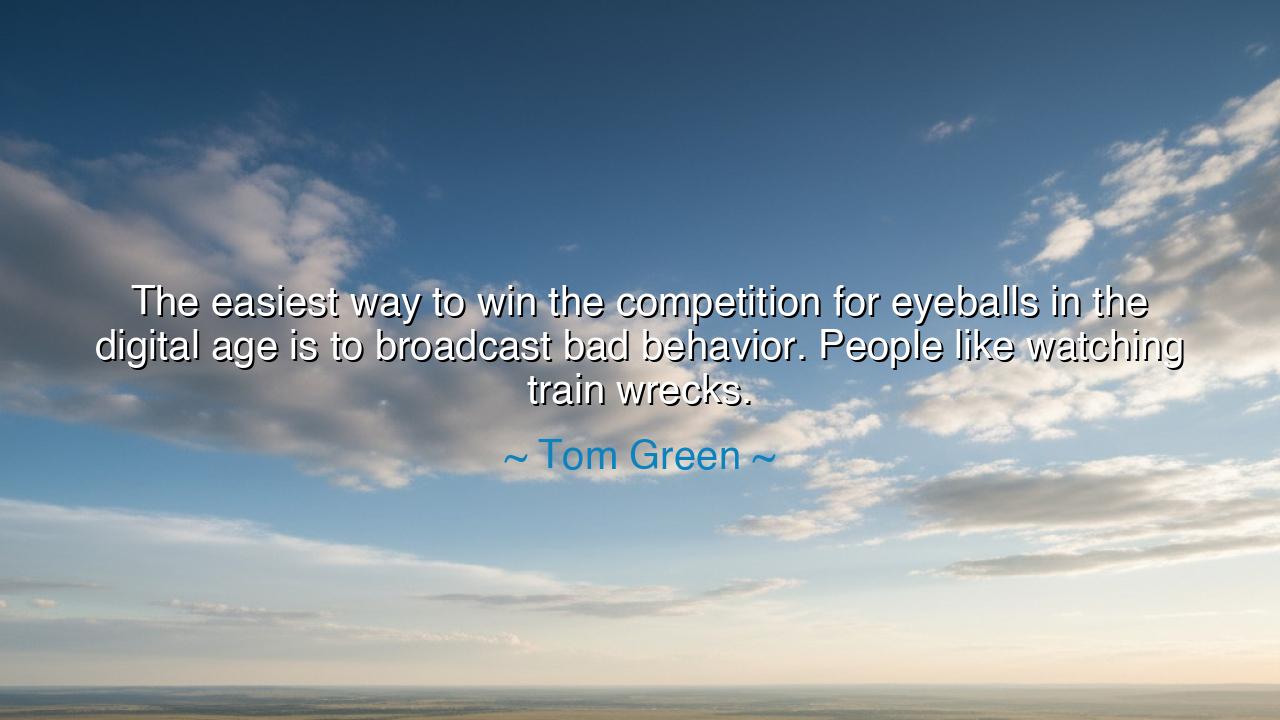
The easiest way to win the competition for eyeballs in the
The easiest way to win the competition for eyeballs in the digital age is to broadcast bad behavior. People like watching train wrecks.






"The easiest way to win the competition for eyeballs in the digital age is to broadcast bad behavior. People like watching train wrecks." — so spoke Tom Green, a man who saw the strange shadows of the new era long before others dared to name them. His words ring like a bell struck in the heart of our times — a warning and a lament, wrapped in bitter wisdom. For he speaks of the digital age, that realm of endless mirrors where men and women seek not understanding, but attention. In this new theatre, the loudest, the wildest, the most reckless performer draws the crowd. And the multitude, drawn like moths to flame, gathers to watch the spectacle — not for beauty, not for truth, but for the thrill of disaster.
In ancient speech we might say: the world has built a new Colosseum, and the gladiators are ourselves. Once, men cheered as lions devoured their victims beneath the Roman sun. Now, they cheer as reputations are devoured on glowing screens. Bad behavior has become the blood sport of the modern age, and the eyeballs — that currency of attention — are the spoils of victory. To gain them is to gain power, fame, wealth, and yet, to lose something far greater: one’s dignity, one’s soul.
The truth that Tom Green unveils is not new — it is ancient, reborn in new attire. The philosophers of old warned of the same hunger in the human heart: the craving for spectacle. In Athens, the dramatists wrote of heroes undone by their own hubris, and the crowds could not look away. In Rome, Nero set fires and played his lyre as chaos consumed the city, knowing that the people’s eyes — horrified yet enthralled — would remain fixed upon him. Even in ruin, he was seen. So too, in our time, the world’s screens flicker with scenes of outrage, conflict, and folly — and the watchers, though they sigh in disgust, continue to look.
There is a strange pleasure in watching the fall of others, for it makes us feel safe in our own frailty, noble in our restraint. Yet this is a false comfort. To feed upon the downfall of others is to rot the spirit from within. The more we feast on these train wrecks, the less we remember how to look for beauty. Like weeds choking a garden, outrage and mockery suffocate our compassion. The soul grows accustomed to noise and forgets the sound of quiet wisdom.
Consider the tale of Diogenes, the ancient philosopher who walked the streets of Corinth with a lamp in daylight, saying he sought an honest man. Were he alive in this age, he might wander through the corridors of the internet with the same lamp, and still find none. Yet he would not despair. He would tell us: "Seek the truth, though the crowd shouts for chaos." For though the digital age rewards madness and noise, the wise heart must learn to resist. The true victory is not in gathering eyeballs, but in guarding vision — to see with clarity, not hunger.
The lesson, therefore, is this: beware the temptation of attention, for it is the easiest prize to win and the hardest to keep without losing yourself. Do not measure worth by the number of watchers, but by the truth of what is seen. The world will tempt you to shout, to provoke, to perform your flaws for applause — but remember, the brightest fires burn out first. Instead, let your life be a steady flame: calm, purposeful, illuminating rather than consuming.
For those who watch, too, there is a duty. Turn your gaze from destruction. Do not delight in scandal, nor reward cruelty with curiosity. For what you watch, you water — and what you water, you grow. If you wish the world to be gentler, more noble, more wise, then feed your eyes with that which uplifts. Every click, every glance is a seed cast into the soil of the world’s soul.
And so, O listener, remember the warning of Tom Green: in this age of endless spectacle, choose not to be the performer of chaos, nor the spectator of ruin. Choose instead to be the creator of meaning, the guardian of truth, the one who lifts rather than shatters. For though bad behavior may win the crowd, it cannot win eternity — and the eyes of the wise, though fewer, see deeper than all the rest.






AAdministratorAdministrator
Welcome, honored guests. Please leave a comment, we will respond soon